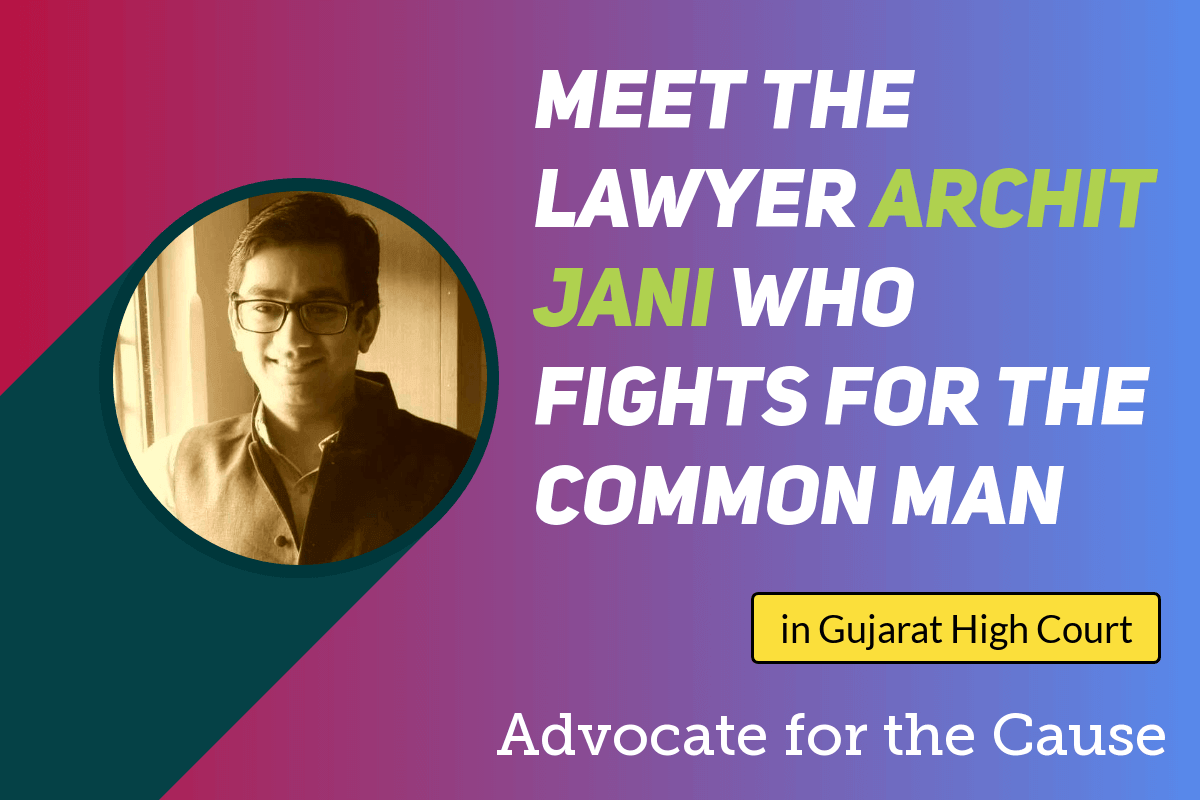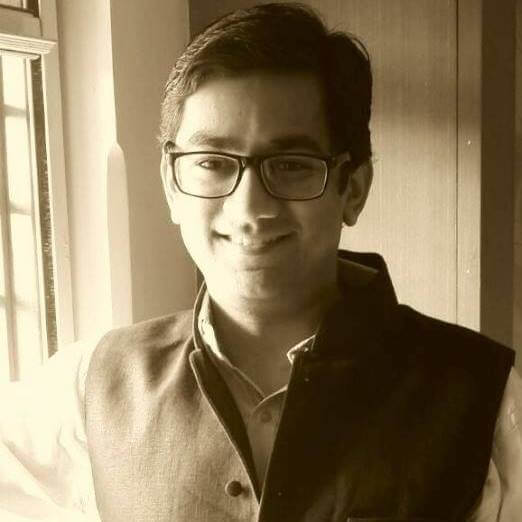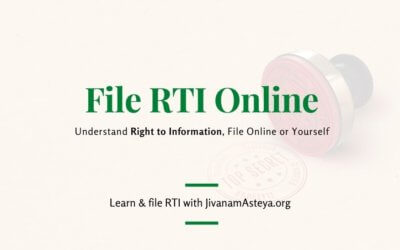Meet the Best Lawyer in Gujarat High Court Archit Jani Who Fights For the Common Man
We, as an NGO, firmly believe in empowering citizens by advocating their civil, criminal and legal rights. However, on the other side, we aim to create awareness among the youth as well as an adult by answering their common questions. We act as an agent of change. We let you know about the people who are creating significant changes in society through their profession. If such people are acquainted at the right time, it changes the lives of the victim positively.
So, let’s Meet the Best Lawyer in Gujarat High Court Archit Jani Who Fights For the Common Man. we are with an offline interview with a renowned lawyer, Mr Archit Jani (He is a practising advocate at the High Court of Gujarat.), where he tells us about his journey as a lawyer, what it takes to be great lawyer, what are the key aspects or strategies which you should keep in mind while practising as a lawyer, power of high courts and several other questions which one might have pertaining to the law.
Q1. Okay so, let’s start with your early education. Could you please tell us about your educational background?
A1. I have done schooling from Sheth C N Vidhyalaya, Graduate (BBA) from NR Institute, Post Graduate (MBA) from California Lutheran University, California, USA and LLB from GLS.
Q2. Were there any individual influences, which motivated you towards the legal profession?
A2. Yes, my Father. (Shri Prakash Jani is a Father of Archit Jani. He is a topmost Reputed advocate in Gujarat, Additional Advocate General of Gujarat. He is a social activist and known for her noble work through PIL.
Q3. So, According to you, what is the kind of interest or aptitude, you think one needs to get into law?
A3. I feel that the lawyer should have an interest in various subjects, more particularly politics, history, sociology, philosophy etc. I have come across many lawyers who are fabulous poet, singer, photographer, traveller, which not only enhances them as an individual but also improves their advocacy in a certain manner.
Q4. Could you please describe your area of expertise and for how long you have been practising law?
A4. I am practising law for the last eight years, mainly in the High court in civil and criminal matters.
Q5. Can you please tell us what type of cases do you generally handle? What percentage of your practice is devoted to (the practice area in question)?
A5.I have handled cases in constitutional, service, cooperative, contract & tender, arbitration, civil, land dispute, criminal matters.
Q6. What are your operation strategies towards it? (It would be great if you describe it with an instance where you successfully handled a situation.)
A6. In any matter, the strategy is the most crucial factor. Strategy can be equated with preparation. One of my seniors’ told me that a case is decided not in the courtroom but in the office of a lawyer. A lawyer is not only required to marshal fact and law but also has to equipped himself by anticipating the queries put by the judge and to counter submissions of the lawyer appearing opposite to him/her.
Q7. So if you were to describe, an approach or philosophy to win or represent a case, what would it like to be?
A7. There is no one approach, but many. Firstly it is about the preparation of the case – obtain information, arrange papers, research on law, drafting, etc. and after that actual presentation before the court wherein the age-old sutra – “know thy judge”.
Q8. How would you address a very general stereotype of middle-class people that a “ High Court advocate charges a big amount of money?”
A8. Advocacy is a noble profession end of the day. I do not see a person coming from the middle or lower strata of society getting deprived of their rights because of the issue relating to lawyer fees. Nevertheless, a person can avail of free legal services of Gujarat High court Legal Aid Services if the litigant fulfils the criteria where a lawyer appointed by the authority.
Q9. Can you please tell us about the extraordinary powers of high courts?
A9. There are numerous powers that can be exercised by the High court under the Constitution of India and statutes. Public Interest Litigation (PIL), Petitions under Article- 226 and 227, Contempt matters, Commercial matters, Bail –Anticipatory bail matters, Quashing matters, Civil appeals, criminal appeals, etc. are examples of matters which are filed in High court.
Q10. So, just out of curiosity, do women married to NRI’s have any sought of relief in Indian courts? (For example, A NRI husband has abandoned his wife in a foreign country, what relief does the wife has in Indian courts, what should be his approach in such a situation?)
A10. It depends on the facts of each case, like religion, citizenship, etc. The matrimonial cases would be governed by personal law.
Q11. Is there anything you wish you had known about the legal profession before becoming a lawyer?
A11. One is always a student of law as learning is a continuous process. As famously said by Mahatma Gandhi – ‘Live as if you were to die tomorrow, Learn as if you were to live forever. With the passage of time, one always realizes how little one knows, especially in the fast-changing world. Therefore, advocacy is often termed as a “Practice” of Law.
Q12. So, in the present scenario, aspiring students have such a mentality that the “ legal profession has reached its saturation point” Do you have any advice for students contemplating the legal profession?
A12.I do not feel that it has reached a saturation point, but there is a rapid change in it. The traditional litigation is perhaps decreasing because of numerous reasons, but at the same time, there are new streams that have developed and have bright scope for aspiring lawyers.
Q13. Could you please state the challenges you think a student faces after graduating with a law degree? (Especially in context to juniors under a lawyer)
A13.I think the challenge is of mindset. Today’s youth is very ambitious and not willing to work under any good lawyer. It is essential to work under any lawyer for a minimum of 5 years; especially one does not have lineage from the legal field. The common complaint which is made by junior lawyers is that they do not get a fair chance to appear before courts.
Q14. What was your life after becoming a lawyer, and how has it changed your life?
A14.It is indeed a matter of pride to be an advocate. My life has drastically changed after becoming an advocate for the better.
Q15. What in your opinion, are the potential streams within the law domain that are overlooked by the law students?
A15.Well, subjects like legal language, interpretation of the statute, etc. are often ignored by students and teachers. There is a radical change in the field where conventional litigation has been reduced, and new fields have emerged or had the potential to emerge; for example- arbitration act, RERA, IB code, competition law, sports law, space law, intonation disputes, etc.
Q16. What according to you, are the key differentiating factors between a practising advocate in district court and a practising advocate in High Court?
A16. District courts have original jurisdiction whereas high court exercises appellate, revisional or constitutional jurisdiction.
Q17. What are your views on the Indian judiciary? Has the doctrine of “separation of power” been accepted in India in its strict sense? If yes, then what are your views on the saying that “Power tends to corrupt, and absolute power corrupts absolutely”, as it would hand over the absolute power in the hand of the judges?
A17.A judge has absolute power and constitutional protection since a judge is the protector of the rights of the citizens. Without any comments, I may say that the system has improved in recent years.
Q18. Could you please share any case that you have fought and it has significantly changed your life?
A18.There is no one particular case but many which grow oneself not only as a lawyer but also as a human being.
Q19. Lastly, as a successful advocate, what is your personal and professional vision.?
A19. Though the earning is the universal object, I wish to espouse the cause of the clients and appear in matters which involve substantial legal issues as also are instrumental for the betterment of society.
So, as Mr Archit Jani rightly quotes
‘Live as if you were to die tomorrow, Learn as if you were to live forever.’
we hope that this offline interview was of learning to you as well. We hope that it addressed every question of an individual who seeks to become a lawyer soon.
Our NGO highly recommends Mr Archit Jani for social causes, PIL related matters, Matrimonial Related Matters, Civil and Property related matter in Gujarat High Court. He is a reliable, Dependable, Trustworthy advocate, his fees are dynamic, and he is one of the few lawyers in India who practise integrity with law. We have referred Mr Archit Jani to citizens who seek representation in their high court cases; they say Mr Archit Jani is a resourceful, knowledgeable person who intends to protect the civil and fundamental rights of the members of society, he is a highly professional yet caring lawyer, who take extreme care of client’s cases, as well as set realistic goals for cases.
You can reach him on WhatsApp: +91 90999 25799. Make sure you take an appointment before calling him over WhatsApp.






0 Comments